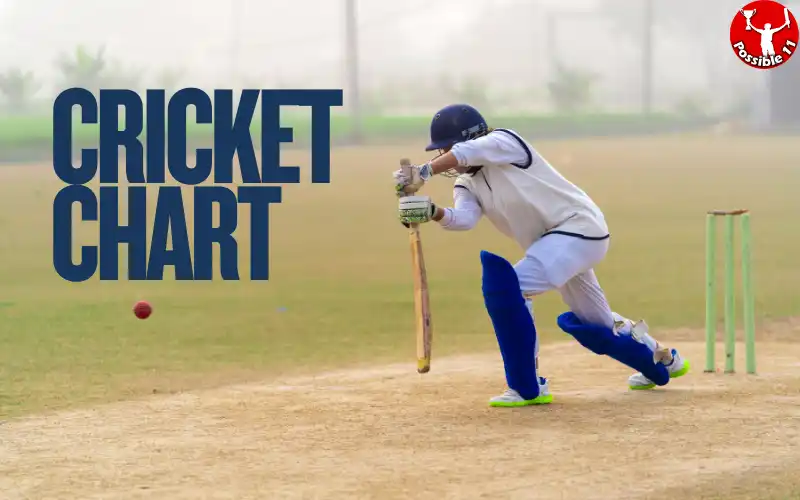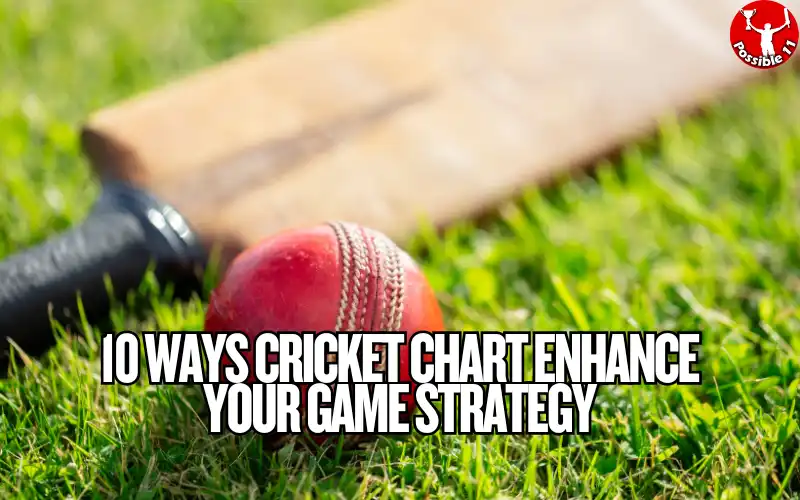Cricket is a game of strategy, skill, and precision. As the sport evolves, possible 11 players and coaches are increasingly turning to data analytics and visual aids to enhance their performance. One of the most effective tools in this regard is the cricket chart. These charts provide valuable insights into player performance, match statistics, and game strategies. Here are 10 ways cricket charts can enhance your game strategy.
1. Visualizing Player Performance
Tracking Individual Metrics
Cricket charts allow players and coaches to visualize individual performance metrics, such as runs scored, wickets taken, and batting averages. By analyzing these metrics over time, players can identify trends in their performance, helping them understand their strengths and weaknesses.
Setting Personal Goals
With clear visual representations of performance data, players can set specific, measurable goals. For instance, a batsman may aim to improve their average by a certain percentage or a bowler may focus on increasing their wicket tally. Cricket charts make it easier to track progress toward these goals.
2. Analyzing Opponent Strategies
Understanding Opponent Patterns
Cricket charts can be used to analyze the performance of opposing players. By studying their batting and bowling charts, teams can identify patterns in their gameplay. For example, a batsman may struggle against certain types of deliveries or bowlers may have a preferred field setup.
Formulating Counter Strategies
Armed with insights from opponent charts, teams can formulate counter-strategies. If a batsman tends to play aggressively against pace bowlers but struggles against spin, the bowling team can adjust their strategy accordingly, deploying more spin bowlers to exploit this weakness.
3. Enhancing Team Performance
Identifying Team Strengths and Weaknesses
Cricket charts provide a comprehensive overview of team performance, allowing coaches to identify collective strengths and weaknesses. For instance, if the team consistently struggles in the middle overs, the coach can focus on strategies to improve performance during that phase of the game.
Optimizing Team Composition
By analyzing performance data, teams can make informed decisions about player selection and team composition. For example, if a particular player excels in chasing targets, they may be included in the lineup for matches where batting second is likely.
4. Improving Match Preparation
Tailoring Training Sessions
Cricket charts can inform training sessions by highlighting areas that need improvement. If a bowler’s chart indicates a high number of runs conceded in the death overs, targeted training can be implemented to address this issue.
Simulating Match Scenarios
Coaches can use charts to simulate match scenarios during practice sessions. By analyzing past performances, they can create specific drills that mimic challenging situations, helping players prepare for real match conditions.
5. Enhancing Decision-Making
Data-Driven Decisions
In cricket, decision-making is crucial. Cricket charts provide data-driven insights that can enhance decision-making on the field. For instance, a captain can refer to batting charts to determine the best time to send in a pinch hitter or to decide which bowler to use in a particular situation.
Real-Time Analysis
During matches, teams can use live data and charts to make real-time decisions. For example, if a batsman is struggling against a specific bowler, the captain can decide to rotate the bowlers or change the field placements accordingly.
6. Facilitating Communication
Visual Aids for Team Meetings
Cricket charts serve as effective visual aids during team meetings. Coaches can present performance data in an easily digestible format, making it simpler for players to understand their roles and responsibilities.
Encouraging Team Discussions
Charts can spark discussions among team members about strategies and performance. By analyzing data together, players can share insights and collaborate on developing effective game plans.
7. Monitoring Progress Over Time
Long-Term Performance Tracking
Cricket charts allow players and teams to monitor their progress over time. By comparing current performance with historical data, players can see how they have improved or identify areas that require further attention.
Adjusting Strategies Based on Trends
As players and teams evolve, so do their strategies. By regularly reviewing performance charts, teams can adjust their game strategies based on emerging trends, ensuring they remain competitive.
8. Enhancing Fan Engagement
Sharing Insights with Fans
Cricket charts can be used to engage fans by sharing insights and statistics during matches. Teams can display charts on screens in the stadium or through social media, providing fans with a deeper understanding of the game.
Creating Interactive Content
Teams can create interactive content using cricket charts, allowing fans to explore player statistics and match data. This engagement can enhance the overall fan experience and foster a stronger connection between the team and its supporters.

9. Utilizing Technology for Analysis
Incorporating Advanced Analytics
With advancements in technology, cricket charts can incorporate advanced analytics, such as predictive modeling and machine learning. These tools can provide deeper insights into player performance and match outcomes, helping teams make more informed decisions.
Using Software for Visualization
Various software tools are available for creating cricket charts, allowing teams to visualize data effectively. By leveraging these tools, teams can create customized charts that cater to their specific needs and preferences.
10. Fostering a Culture of Continuous Improvement
Encouraging a Growth Mindset
By utilizing cricket charts, teams can foster a culture of continuous improvement. Players are encouraged to analyze their performance data regularly, leading to a growth mindset where they are always looking for ways to enhance their skills.
Celebrating Achievements
Cricket charts can also be used to celebrate individual and team achievements. By highlighting milestones and improvements, teams can motivate players to strive for excellence and maintain high levels of performance.
Conclusion
Cricket charts are invaluable tools that can significantly enhance game strategy. From visualizing player performance and analyzing opponent strategies to improving decision-making and fostering communication, the benefits of using cricket charts are manifold. As the game continues to evolve, leveraging data analytics and visual aids will become increasingly important for players and teams aiming for success.
By incorporating these 10 ways cricket charts enhance your game strategy, players and coaches can gain a competitive edge, improve performance, and ultimately achieve their goals on the cricket field. Embrace the power of data and visualization, and watch your game strategy reach new heights!











